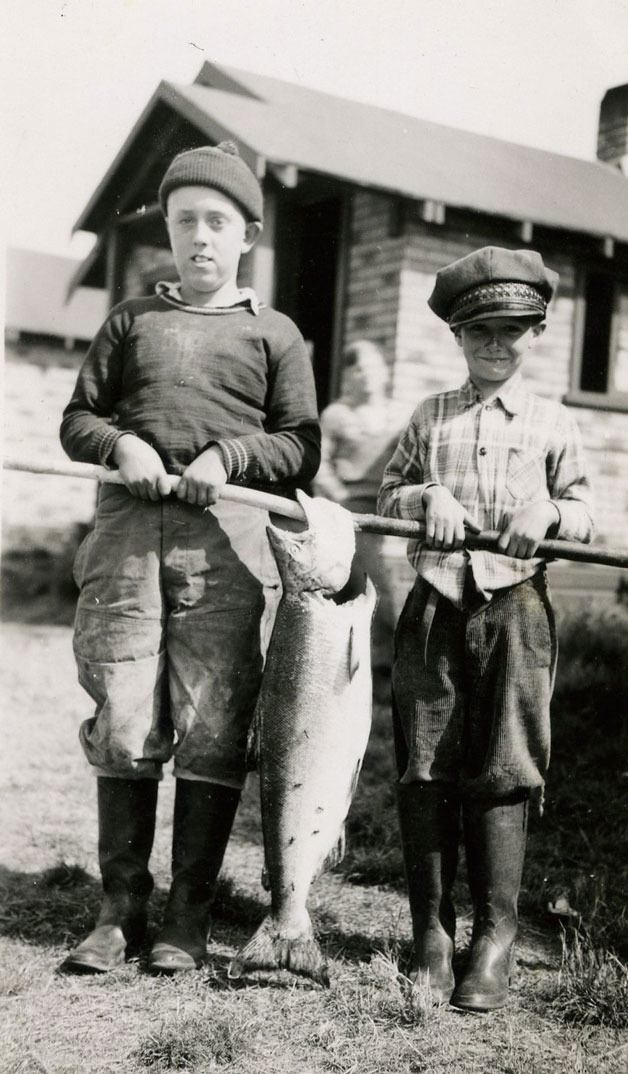Bill Haroldson remembers the big one that got away during the glory days of Whidbey Island salmon fishing, when 30-pound kings were common.
It was in the mid-1950s, when he was in high school. He was in a small boat in front of the ferry dock at Clinton when the big guy grabbed the bait.
“I battled him for two hours, then the line broke,” Haroldson said.
Luckily the ferry was just coming in, and people were watching the climax of the epic struggle from the deck.
“One of them was from the Seattle Times, and he wrote it up,” Haroldson said. “We have proof.”
“I caught more fish there than in any other spot,” he added.
Haroldson will share stories, photos and oral histories about salmon fishing’s local heyday this weekend in Bayview, part of the South Whidbey Historical Society’s “Then and Now” series.
“Of Resorts, Salmon and Fishing Derbies of South Whidbey Island (1930-1960)” will be at 2 p.m. Sunday, May 1 at the South Whidbey Senior Center, 14594 Highway 525.
“They’re part of the island’s history that’s almost totally gone,” Haroldson said of the rustic resorts catering to visiting anglers. “I miss them, but time marches on and things change.”
In the 1930s, ’40s and ’50s, when sport fishing was the rage and salmon plentiful and accommodating, resorts and fishing cabins sprung up along the shores of Whidbey.
Haroldson said the resorts began to appear in the 1930s, after first the automobile and then the ferry made it possible for mainlanders to discover the fertile fishing grounds of the island, and islanders with beach property discovered an economic opportunity.
Resorts with names such as Gregson’s, Bush Point, Robinson’s and Hap’s appeared on both sides of the South End, he said.
Much of Haroldson’s oral history draws from the recollection of Warren Farmer, whose father Charles founded Bush Point Resort in the 1930s. Warren Farmer and his wife Darla still live at Bush Point.
Haroldson said the resorts featured snug one-room cabins with a wood stove and occasional running water and electricity. People came for a weekend or a week, bringing their sleeping bags and 25 pounds of ice for the icebox.
“Some of the cabins were fairly nice, but others were very, very primitive,” Haroldson said. “They didn’t have plumbing.”
But a cabin was just a place to sleep. The customers came for the fish.
Salmon were abundant, and all you needed was an outboard motor and fishing tackle, Haroldson said. You could rent a sturdy 16-foot boat and fish close to the resort.
During the Great Depression of the 1930s, most people had little disposable income to spend on a weekend’s relaxation. They came to fish for fun, but also to feed their families.
To boost business, resorts began to sponsor fishing derbies, with prizes of money, boats and motors going to those who caught the biggest fish, Haroldson said.
“I never liked to fish in derbies,” said Haroldson, who started coming to the island with his family as a young child. “I liked to fish when there weren’t so many boats around. I didn’t need a prize.”
Following World War II, the resorts flourished again as veterans returned and sought inexpensive family getaways.
During the 1950s, however, things began to change on the island.
People bought their own boats, then bought land to build their own cabins.
By the late 1960s, salmon fishing was in decline as more and more regulations were clamped on sport anglers.
“It’s a sad commentary that salmon fishing has gotten to where it is,” Haroldson said. “It’s a recreation a lot of us appreciated.”
It all added up to the demise of the island’s fishing resorts. Resort owners began selling their property to former customers. Summer cabins replaced resort cabins. No resorts remain on the island today, Haroldson said.
Meanwhile, many of those families who first came for weekend fishing trips to a resort are now living on Whidbey Island. They talk about their grandparents who first brought them to the island, and are hosting their grandchildren.
Many of the summer cabins that replaced the resort cabins have themselves been replaced by homes, some of them large.
Haroldson, 73, a retired Seattle school teacher, moved to the island a few years ago. But his local salmon-fishing roots go way back.
“As long as I can remember, I had a fishing pole in my hand,” he said of his Whidbey visits. “At first it was small perch off the dock, but as I got older, it was salmon fishing all the way.”
“My fondest memories were catching king salmon over 20 pounds in a small boat near the ferry dock, playing the fish for more than an hour before getting them into the net,” Haroldson said. “That’s my prize right there.”



